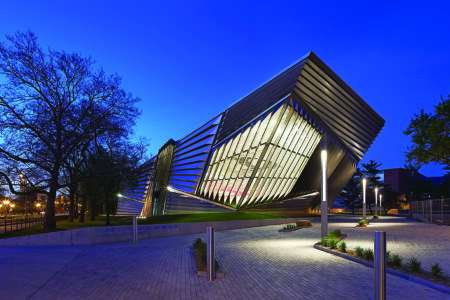
In an age defined by rapid urbanisation and burgeoning infrastructure demands, civil engineering has emerged as a harbinger of progress and innovation. As the global population continues to surge, so does the need for resilient and sustainable infrastructure that can meet the demands of a changing world with a changing climate.
All of this breathes life into the aspirations of civil engineers today. From the water we drink to the roads and bridges we travel on to the buildings we work and live in, civil engineers have planned, designed, operated and maintained all aspects of the built and natural environment as we know it. Today, the emergence of industries like renewable energy, smart cities, and climate change adaptation present even more exciting opportunities for civil engineers to make their mark in.
If you’re seeking an advanced education that can boost your career in this field, choosing the right university is vital. Here are four US universities to consider:

Source: Michigan State, Department of Civil & Environmental Engineering/Facebook
Michigan State University
Michigan State University (MSU) is an R1 research institution and a top 100 Global University that is uniquely positioned at the cutting edge in terms of the state of the art and the state of the practice.
Its online Master of Science in Civil Engineering programme empowers students to excel in a rapidly changing and globally connected world. Ranked as one of the best online programmes for a Master’s in Civil Engineering by the US News and World Report, it offers a flexible and comprehensive learning experience catering to working professionals and full-time students. If you have a Bachelor of Science in Civil Engineering, environmental engineering, or a related field, the highly ranked programme could help you get to the next stage of your civil engineering career.
The curriculum covers foundational principles and emerging areas of civil engineering. From connected and automated vehicles to sustainability and data science, students will gain the skills to tackle infrastructure challenges in today’s data-driven world. With three focus areas — transportation, pavement and structural engineering disciplines — to choose from, students can learn to use cutting-edge software for statistical analysis and modelling, enabling them to design smarter, more durable, safer, and sustainable transportation and pavement systems.
Students are taught by full-time, experienced, research-active faculty that impart fundamental principles and techniques in a flexible online learning environment. The fully asynchronous and self-paced online format ensures that working professionals can balance their careers with an advanced education while full-time students have the flexibility they need to fit around their commitments. Admission is rolling, and MSU continually expands their course offerings to stay aligned with industry trends and demands.
Each student’s unique career aspirations are important to MSU. Staff and faculty not only provide direct contact but also dedicate time to help students develop personalised study plans that are well aligned with their personal and professional career goals. The learning environment is open and accessible as well, fostering direct interaction with faculty members with extensive practical experience. Click here to learn more about the programme.

Department of Civil, Architectural, and Environmental Engineering’s graduate programmes prepare students to be at the forefront of industry, academia, civil service, and beyond. Source: University of Texas at Austin/Facebook
University of Texas at Austin
Ranked among the country’s biggest and best research universities, the University of Texas at Austin (UT Austin) is home to a sizable connected community of over 52,000 students and 3,000 teaching faculty. Here, the aim is to provide students with opportunities to participate in groundbreaking research while enjoying cutting-edge teaching and learning techniques.
Its Cockrell School of Engineering is a top-ranked engineering school with the #1 engineering programme in Texas. In fact, UT Austin has been a global leader in technology advancement and engineering education for over a century — as evidenced by its ability to produce four National Medals of Science and Technology winners and one Nobel Prize recipient.
The complex problems surrounding the nexus of cities, water, and energy demand that engineers have increased breadth and depth of knowledge. That’s where UT Austin’s graduate programmes in the Department of Civil, Architectural, and Environmental Engineering (CAEE) come in. They are known worldwide for developing students into leaders in engineering practice, research, and education. Here, students can pursue a Master of Science in Engineering degree in Civil Engineering and Environmental and Water Resources Engineering, whereas the PhD degree is offered only in Civil Engineering.
“It is an exciting time to be in Civil, Architectural and Environmental Engineering at UT Austin. What we do has become important and challenging as the world population grows in the face of expanded urbanisation, limited resources and changing climatic conditions,” says department chair Robert B. Gilbert. “We are leading major changes in energy, transportation, water management and treatment, sustainable construction and materials, and information technology.”

The Department of Civil Engineering at the University of New Brunswick offers research-based programmes of study leading to MEng, MScE, and PhD degrees in civil engineering. Source: University of New Brunswick/Facebook
University of New Brunswick
The University of New Brunswick (UNB) has an illustrious history dating back to 1785, making it the oldest English-language university in Canada. Its Department of Civil Engineering is part of the Faculty of Engineering at UNB, where the first civil engineering lecture in Canada was held in 1853.
Today, the Department of Civil Engineering is building on its track record of excellence to offer a fully accredited, four-year undergraduate programme leading to a BSc in Civil Engineering, as well as Master of Engineering (MEng), Master of Science in Engineering (MScE), and Doctor of Philosophy (PhD) in Civil Engineering programmes. Each programme allows students to get hands-on experience in specialised facilities fitted with the latest technology, such as hydraulics, concrete mixing and soil laboratories.
Research here is as renowned as it is prolific. The programme has between 40 and 60 graduate students conducting research in all the major sub-disciplines of Civil Engineering. Among the research areas are Construction Engineering and Management, Geotechnical Engineering, Engineering Materials and Infrastructure Renewal, Structural Engineering, Transportation Engineering, and Water and Environmental Engineering
In addition to various research groups within the department, graduate students benefit from collaborating with other researchers in engineering, the natural sciences and industry.
All of this has led UNB’s graduates to gain the necessary engineering skills to plan, design and manage the essential infrastructure of modern society. From highways and bridges to water treatment plants and energy-efficient buildings, UNB provides its graduates with a solid foundation to advance their careers with consulting engineering companies, NGOs, provincial and federal government agencies, and academic and research organisations around the world.

At University of California, Irvine, there are two options for master’s degrees: a thesis option and a non-thesis option. Source: UC Irvine/Facebook
University of California, Irvine
As a top 10 public university in the US, the University of California (UC), Irvine aims to catalyse the community and enhance lives through rigorous academics, cutting-edge research, and dedicated public service.
Home to the Henry Samueli School of Engineering, it is ranked 21st in US News & World Report’s current listing of best public engineering graduate schools. Its Department of Civil and Environmental Engineering (CEE) has a mission statement that succinctly encompasses its teaching and identity: to provide students with a comprehensive educational programme and to expand engineering knowledge through an active and exciting undergraduate and graduate research programme.
“With 28 full-time faculty (plus six affiliated faculty), over 480 undergraduates, 140 graduate students, dedicated staff, and industry connections via the CEE affiliates, we offer a broad interdisciplinary academic environment where our students can grow, thrive and earn an excellent engineering education,” says Jean-Daniel Saphores, Professor and Chair of the CEE.
Here, students pursue MS and PhD degrees in civil and environmental engineering. They are taught by faculty members who are world leaders and boast expertise in research areas such as hydrology and water resources systems, structures, geotechnics and materials, transportation systems, and environmental and energy systems.
Students also get to participate in four world-class affiliated centres (the UC Irvine Water-Energy Nexus Centre, the Institute for Transportation Studies, the Centre for Hydrometeorology and Remote Sensing, and the Advanced Power and Energy Program). The result? Students are exposed to real-world challenges and empowered to become change-makers.
*Some of the institutions featured in this article are commercial partners of Study International










